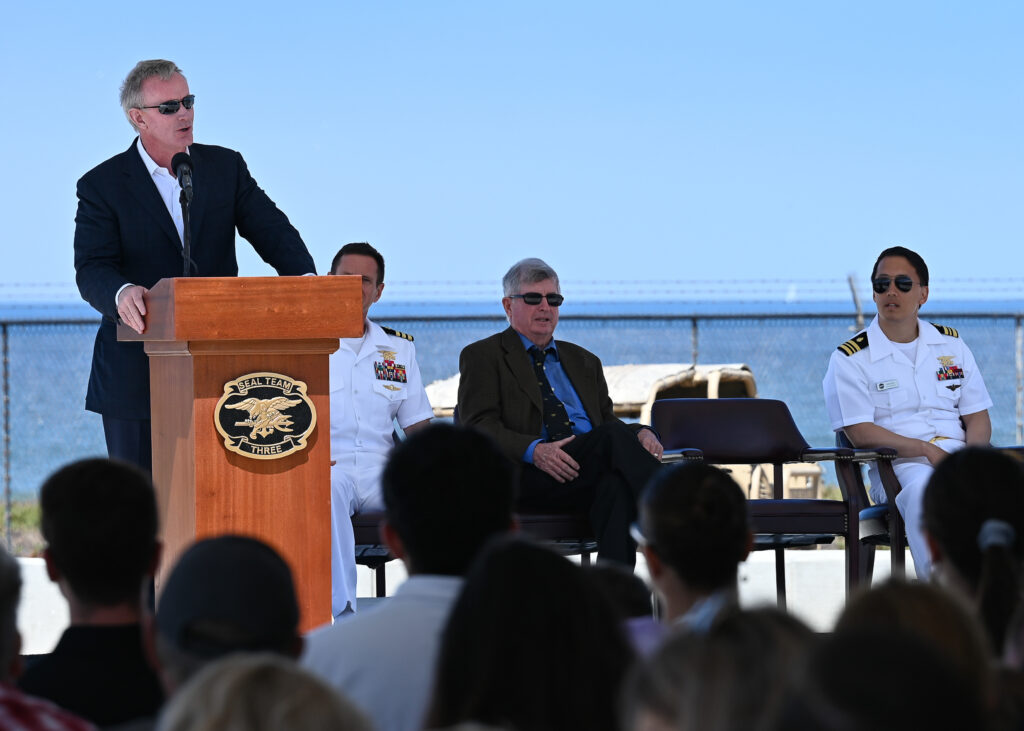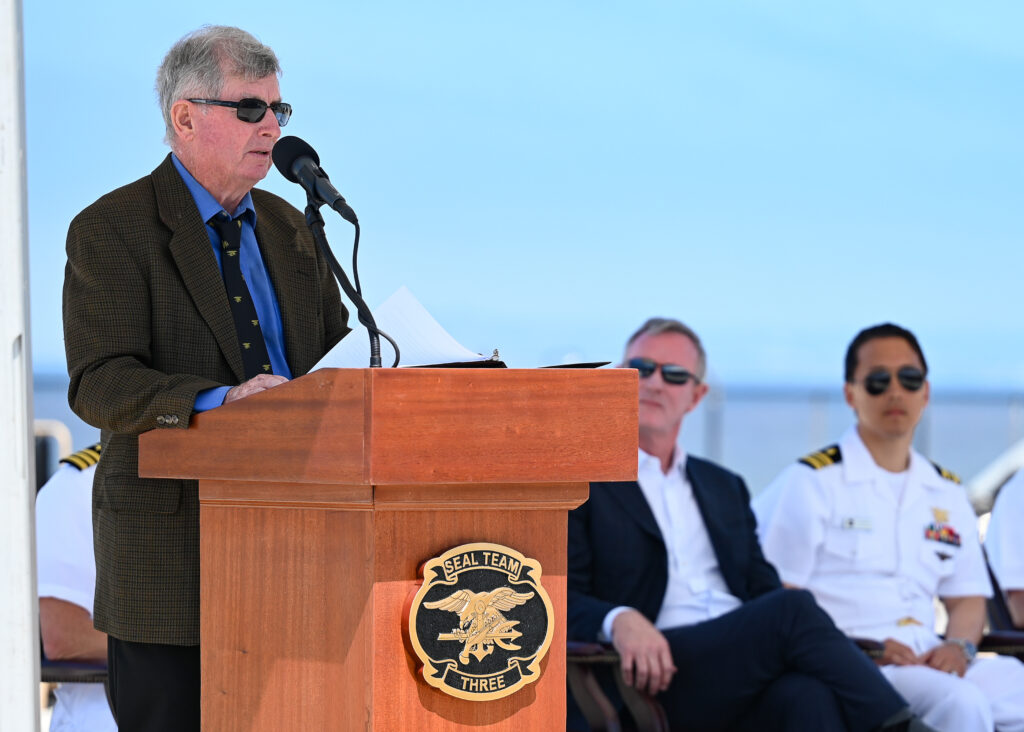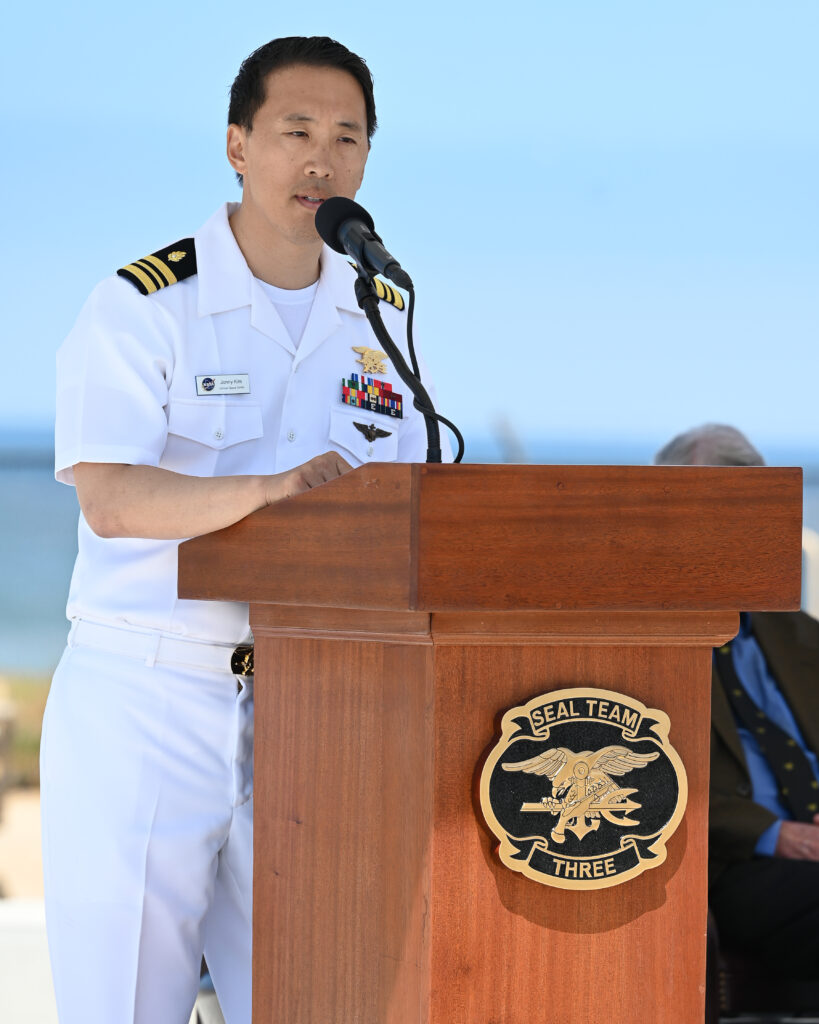It’s a bright, cloudless day. A gentle ocean breeze flows over the terrace as the crowd begins to take their seats. Officers, enlisted personnel, Gold Star family members and friends fill the seats on the Silver Strand Training Complex, the new home of West-Coast based Naval special warfare operators. They gathered together to celebrate a very special occasion – the 40th anniversary of SEAL Team THREE.
SEAL Team THREE’s 20th commanding officer gave the opening remarks and gave the plankowners – the founding members of the team – his thanks.
“We are all here today because of your bold leadership and spirit of innovation. We stand on the shoulders of giants,” he said. “I am happy to report that the culture you established all those years ago is thriving in the troops behind you and the halls of Team THREE.”
Though SEAL Team THREE was formally established in 1983, the history of the SEAL teams predates Team THREE by more than 20 years. In his inaugural address in 1961, President John F. Kennedy quelled the fears of the nation facing a new-era of strife and conflict.
“Let every nation know, whether it wishes us well or ill, that we shall pay any price, bear any burden, meet any hardship, support any friend, oppose any foe to assure the survival and the success of liberty,” Kennedy said. “This much we pledge–and more.”
In January 1962, President Kennedy established the first SEAL Teams at Naval Amphibious Base Coronado, California, and Naval Amphibious Base Little Creek, Virginia. The teams were comprised of warfighters from the Amphibious Scouts and Raiders (Joint) and Special Mission Naval Demolition Units, lending to the name “SEALs”, which stands for “sea, air and land.”
The establishment of the first SEAL teams paved the way for Team THREE’s commissioning in October 1983. Though a path had been laid before them, the Team’s impressive record speaks for itself.

Retired Adm. William McRaven, former commanding officer of SEAL Team THREE and the ninth commander of United States Special Operations Command, spoke to Team THREE’s immense legacy and commitment to the country’s safety and security in the post-9/11 landscape.
“Some of the first units into Afghanistan were SEAL Team THREE,” said McRaven. “Between 2002 and 2005, the teams deployed to Iraq, Afghanistan, and the new hotspot – the Philippines. From the oil fields of the Al Faw peninsula to Fallujah, to Habbaniyah. From Zamboanga to the Horn of Africa, the operators of SEAL Team THREE were everywhere, contributing to ever single aspect of the war effort.”

The Team wasn’t just given those missions, though. From the onset, they had to work tirelessly to gather the resources and manpower needed to commission a team built for success. Retired Capt. Joe Quincannon, SEAL Team THREE’s first commanding officer, touched on the challenges he faced while putting together a combat-ready team.
“When the Navy gave me the opportunity to commission the command, my first priority was getting the right senior enlisted on board,” he said. “I was focused on people who had proven themselves fighting in Vietnam. A giant step forward in attaining this goal was when Master Chief Gallagher agreed to become the command master chief. His combat experience, reputation and common-sense approach to problem solving were instrumental in helping me attain the goal I had for the command – which was to fight and win if called upon by the country.”
People were not the only resource needed though. Funding allocated to outfit the command was imbalanced. The warfighters needed weapons, personal protective equipment, night vision gear and more.
“The main problem was the imbalance between the operations and procurement funds” Quincannon said. “Simply put, I couldn’t use the operations funds to buy the equipment we needed.”
Eventually, Quincannon was able to procure exactly what the command needed to be successful. And it paid off – he volunteered his new team for deployment based on their outstanding training record, and they got to go.
Though it’s been decades since that first deployment, the fabric of SEAL Team THREE remains the same. Woven into the command is an enduring legacy of selflessness, bravery and camaraderie.
“Our fallen brothers, those we will see on the other side, the never forgotten stewards will forever remind us – the duty bound – that we are the owners of our legacy,” said SEAL Team THREE’s current Command Master Chief. “It is our charge to honor them by passing down our lessons learned from conflict to conflict. To honor their sacrifice by our deeds and ensure that their names will forever echo.”
Whether it is routine training or large celebratory ceremonies, SEAL Team THREE’s permanent residents (fallen members) are woven into everything the team does. Each one has a command space dedicated to them, and each is spoken about and remembered. One of SEAL Team THREE’s current special warfare operators spoke about the sense of duty and honor that comes with being a part of a command so steeped in Frogman history.
“One of the first things we do as a ‘new guy’ on the team is give a presentation to our platoon about one of our fallen,” the operator said. “It really helps us all remember the immense legacy we are upholding. We’re just renters here. Our permanent residents – those are the owners. That brotherhood and sense of duty and connectedness is so deeply rooted here, and it’s a huge part of why we do what we do.”
As the current Frogmen of SEAL Team THREE go forward into a new era of ever-evolving uncertainty, one thing has remained unchanged for the past four decades – the heart and tenacity of the men who choose to become United States Naval Special Warfare Operators.

“A part of me hopes you never have to experience the harsh ugliness and realities of war, but a more familiar part of me understands, that if called, you will gladly welcome it,” said Lt. Cmdr. Jonny Kim, a NASA astronaut and SEAL Team THREE alumni. “And if that call comes, be swift, violent and lethal to our enemies. But never lose your way. You are the 1% of the 1% not because you do the hard things no one else can, but because you do the hard things no one else can while holding yourself and your teammates to a higher standard of judgment and accountability than our enemies.”
Since 1962, Naval Special Warfare has been the nation’s premier maritime special operations force – a highly reliable and lethal force –ready to conduct full-spectrum operations, unilaterally or with partners, in support of national objectives, and uniquely positioned to extend the Fleet’s reach, delivering all-domain options for naval and joint force commanders.
Story by Petty Officer 1st Class Chelsea Meiller
Naval Special Warfare Group ONE
RELATED:
From Making Your Bed to Being a Bullfrog: Admiral William McRaven Shares Wisdom with Coronado




